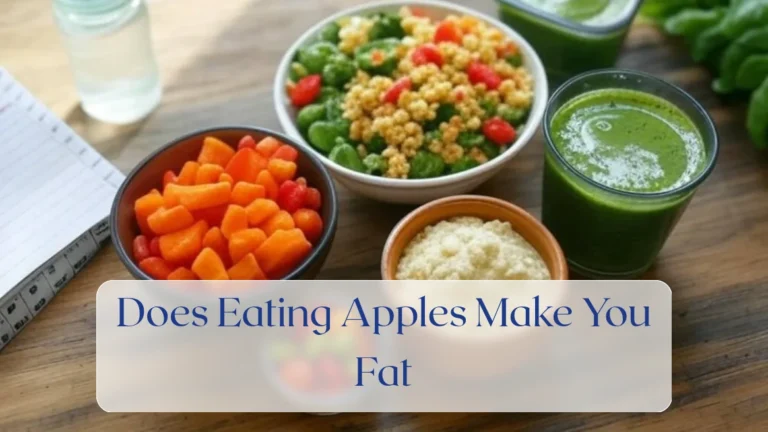Do Fruit Sugars Make You Fat? The Truth Revealed
Is that mango lassi sabotaging your weight loss goals? Many of us wonder about the effects of fruit on our weight. There’s a lot of confusion around fruit and weight gain—this post aims to clear it up. You’ll learn how to enjoy fruits without guilt, understand the difference between fruit sugar and added sugar, and make informed choices for healthy weight management. Fruit, while incredibly nutritious, does contain sugar. But fruit sugar isn’t the enemy—understanding the type and quantity is key to healthy weight management.
Fruit Sugar vs. Refined Sugar: What’s the Big Difference?
Natural fruit sugars, like fructose and glucose, are found naturally in fruits and vegetables. These sugars are often bound to fiber, which slows down their absorption into the bloodstream. In contrast, refined sugars, like those found in processed foods and sugary drinks, are rapidly digested and absorbed, causing a significant spike in blood sugar levels. This rapid surge can lead to increased insulin production, potentially storing excess calories as fat. This is why refined sugar is a much bigger concern for weight gain than the natural sugars found in fruits. The body processes natural fruit sugars more gradually and efficiently, minimizing the risk of weight problems associated with refined sugar intake.
The Role of Fiber in Fruit and Weight Management
Fiber, generously available in most fruits, plays a crucial role in weight management. It slows down the absorption of sugars, preventing those rapid spikes in blood sugar and preventing insulin production from increasing significantly. Furthermore, fiber promotes satiety – it makes you feel full for longer – so you’re less likely to overeat following consumed fructose (or fruit) throughout the day. Fiber also aids digestion. A healthy digestive system is integral for optimizing nutrient absorption and overall well-being, affecting fat content in your diet more generally. Thus, its influence against potential weight gain goes above how it relates directly to “do fruit sugars make you fat” scenarios, too.
Portion Control: The Key to Enjoying Fruit Without the Guilt
Enjoying fruits guilt-free is all about portion control and mindful eating. Recommended daily serves can vary in comparison with differing caloric estimations you may possess—though to give some general guidelines for common Indian fruits, one medium-sized apple or banana should suffice. Avoid mindlessly eating or excessively snacking fruits – pay attention when/how much; focus on its enjoyable aspects, not just on how much you are consuming when you do. Your body’s sugar tolerance also varies depending on various personal-based factors beyond the immediate scope discussed at hand–observe trends after appropriate fruit quantities, in particular.
Fruits Rich in Nutrients, Low in Sugar: Indian Superfoods
Many Indian fruits are low in sugar while packing a significant nutrient punch. Examples include guava, which provides ample nutrients along with few inherent sugars; amla (Indian gooseberry), which offers remarkable antioxidant properties in smaller portions, less in added fructose levels relative to more popular treats available, though no less delicious all too; and jamun helps in maintaining appropriate glucose readings in daily observations after various meals within the day without any extra measures required elsewhere towards regulating individual health-level management or maintenance schedules. These fruits offer benefits far beyond sweetness – offering vitamins, minerals and numerous anti-oxidative elements important both specifically toward glucose levels or overall energy health–meaning this aspect affects any possibility fruit sugars make one fat.
Beyond Sugar: The Whole Picture of Fruit’s Impact on Health
Fruit contains much beyond sugar. Essential vitamins, various minerals, plus antioxidants protect against cellular damage—all contributing massively in maintaining healthy cellular processes all over our insides. Hence, there’s so much positive impact beyond satisfying your sweet tooth–these nutrients promote long term health. The combined benefits drastically outweigh the minimal negatives potentially causing weight troubles when mindful consumption is applied accordingly along dietary adjustments based thereupon for consistency sake along said plan regarding personal maintenance regimes applied long-terms for sustainability outcomes associated therefrom given personal traits etc.; as applicable appropriately towards optimal performance throughout their daily lifestyle decisions implemented henceforth for ideal efficacy resultant. Adding more fruit into a daily diet supports overall health well beyond mere added sugars from this singular source alone.
Frequently Asked Questions (FAQs)
Are all fruits created equal in terms of sugar content? No. Fruits vary vastly. Some are naturally higher (like mangoes or bananas) compared than others which are lesser (like berries or grapefruit). This also factors into serving sizes being adjusted on a person-specific case according as appropriate for that lifestyle/etc.
Can I eat fruit at night without gaining weight? Yes. but focus on lower sugar concentration and moderation. Ensure it stays as part some greater sensible nutrition program! (Otherwise even so, too many overall can still affect outcomes). Be wise and conscientious towards portion sizes consumed specifically at these times depending personal tolerance capabilities assessed for efficacy beforehand as needed towards specific body type and activity levels during the course daily activities scheduled theretowards optimally function each individual needs.
What are some healthy ways to include fruits in an Indian diet? Blend into smoothies, add chopped ones for extra flavor salads/yogurts, to make tasty morning starters etc, etc,, etc.. There are more exciting creative pathways within every kitchen’s repertoire given enough resourceful imagination to combine foods wonderfully for improved intake. Try several avenues or get more recipes directly–all of these pathways lead toward improved dietary satisfaction, too. The key remains within mindful approach and adjusted meal/recipe structures accordingly per need, overall.
Is dried fruit better or worse than fresh fruit for weight management? Dried fruit is significantly more concentrated in both sugar and calories. Fresh is normally way better.
What should I do if I have concerns about my blood sugar levels and fruit consumption? Consult a doctor or nutritionist. They may adjust your needs appropriately within individual capabilities, based according health profile/assessment of ongoing maintenance needs applicable thence throughout this journey toward self-care management (given factors involved at play determining overall goals accordingly for sustainability achieved). They ensure optimized overall wellbeing overall long-term success rates are kept optimal when necessary, given specific condition of person etc etc
Conclusion
Fruit sugar isn’t inherently bad, it is important to remember. Proper portion control and appropriate mindful eating and/or choosing nutrient-rich options; these are all crucial factors towards proper nutritional levels while keeping to healthy weight management schedules. Share your thoughts and some favourite low or medium-sugar Indian fruits in the comments below–let others know your experiences too at this part also. Let others’ findings affect you too–and benefit from this community built together from discussions regarding best practices that work personally towards successful application within broader public knowledge base. Remember your progress requires self-awareness via active involvement of community too.



